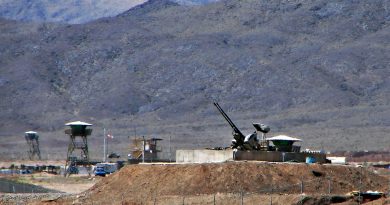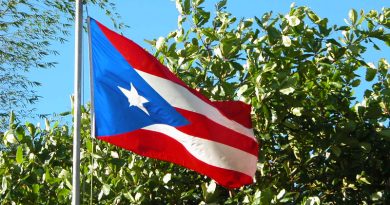Nikki Haley Goes From Trump Critic to His Pick for the U.N.
By Daniel Garay
Staff Writer
On November 23, United States President-elect Donald Trump nominated Governor Nikki Haley of South Carolina as the country’s next permanent representative to the United Nations. Upon confirmation by the Senate, Haley, a rising Republican leader, would replace Ambassador Samantha Power.
Haley, 44, who is of Indian decent, was the first female appointed to Trump’s Cabinet. The announcement came at a time when Trump’s White House staff members and Cabinet picks fell under scrutiny for a lack of diversity, with most of them being older, white males.
Haley became the first female governor of South Carolina in 2011. She came into the national spotlight in the aftermath of the mass shooting by a white supremacist at a historic black church in Charleston, SC, in June 2015. Later, it was revealed that the shooter had sympathized with the Civil War-era Confederacy. Gov. Haley, to much protest, called for the Confederate flag flown on the state capitol in Columbia, SC, to be taken down.
A couple of weeks before the shooting, as reported by The Washington Post, the governor played a role in passing state legislation to obstruct the actions of the Block, Divest, and Sanction movement (BDS), a pro-Palestinian campaign set to end the Israeli occupation of Palestine. According to The New York Times, Israel was one of the first countries to express favor for Haley’s nomination.
She was a staunch opponent to Donald Trump during the campaign, supporting instead Sen. Marco Rubio (R-FL) in the primary process until he dropped out and she endorsed Sen. Ted Cruz (R-TX), The New York Times reports. Haley, a daughter of Sikh parents, called Trump’s call for a ban on Muslim immigration “absolutely un-American,” reports CNN.
She was chosen to deliver the Republican rebuttal to President Barack Obama’s final State of the Union Address in January, where she also admonished “the angriest voices” in an indirect reference to Donald Trump. This led to Trump posting on Twitter, “The people of South Carolina are embarrassed by Nikki Haley!” Gov. Haley responded cordially, posting, “Bless your heart,” according to Politico.
Trump has a history of interaction with the U.N. starting in 1998, with the construction of the Trump World Tower in the United Nations Plaza. In a 1998 New York Daily News article, then-Secretary-General Kofi Annan said at a conference, “It’s going to cast a long, long shadow over everybody who lives in that neighborhood.”
In 2005, in an interview with ABC News, Trump weighed in on the renovations to the U.N. Headquarters. “I could do it for $500 million, what they’re going to spend $1.6 billion for. The only difference is my job would be better,” he said. The U.N. invited him to bid on the job against other companies, but he never made such an offer.
As a candidate, President-elect Trump said very little about the U.N., but it was clear during the campaign that he was against some of the organization’s progressive stances.
Trump has staunchly opposed action on climate change, which the U.N., under U.S. leadership, vowed to combat in the Paris climate agreement last year. Foreign diplomats, according to The New York Times, are preparing to fight climate change without the United States.
As part of the transition proceeds, Trump has placed notoriously informal calls to world leaders. Causing alarm to India, Trump reportedly told Prime Minister Nawaz Sharif of Pakistan, “I am ready and willing to play any role that you want me to play.” According to Reuters, China protested Trump’s call to President Tsai Ing-wen of Taiwan, the first contact made by a U.S. President since 1979.
“Friday’s incident with the Taiwan phone call makes plain that there are real dangers in misperception, and it might fall to Haley to talk the Chinese down if we continue to badger them,” said Dr. Martin Edwards, a professor at the School of Diplomacy.
“If we as Republicans are going to lead effectively and have staying power as a governing party, we must accept that Donald Trump’s election was not an affirmation of the way Republicans have conducted themselves,” said Haley to the Federalist Society, in the aftermath of the general election, giving hope that she could keep Trump in line on diplomatic affairs. “Can she tell them they’re wrong? Sure,” Dr. Edwards said. “Will they listen? Who would they listen to more? Someone on the phone from New York or Flynn or the Secretary of State?” he added, referring to Michael Flynn, Trump’s pick for National Security Adviser.
As a leader in the Security Council, Ambassador Power spent her tenure focusing on climate change, on the crisis in Syria, and on unanimous sanctions against North Korea. Dr. Edwards believes Power’s achievements present a challenge for her successor. “Haley has very big shoes to fill,” he said. “The issue with the Security Council is interesting, and it turns largely on whether we’re moving from opposing Russia to embracing it.”
Despite her opposition to his candidacy, Haley has accepted Trump’s nomination and expressed willingness to work with his administration. “When the President believes you have a major contribution to make to the welfare of our nation, and to our nation’s standing in the world, that is a calling that is important to heed,” she said in a statement, according to CNN.


